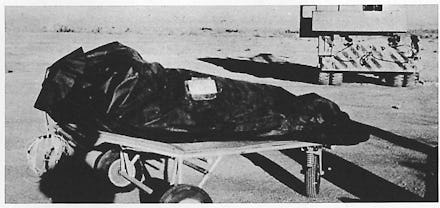You Can Now Look at 130,000 of the Air Force's Declassified UFO Documents Online

If you've ever fallen down the Wikipedia rabbit hole searching for evidence of aliens and unidentified flying objects, it's your lucky day.
UFO enthusiast and filmmaker John Greenewald has collected over 130,000 pages of declassified government documents about UFOs and uploaded them to a website called the Project Blue Book Collection. The database features every declassified document from Project Blue Book, the Air Force program for the investigation of UFOs, including photos, case studies and unexplained incidents.
Although declassified documents like this have been available to the public for some time, Greenewald told CNN his database is the first to put all documents in one place. It also includes files from Project Sign and Project Grudge, two other government UFO investigations.
Among the cases featured on the site are the Exeter incident, the Kenneth Arnold sighting and the Mantell crash, all of which occupy highly publicized spaces in the world of UFO enthusiasts. The collection also includes many less-talked about incidents, like a 1956 sighting in San Bernardino, California, and 1950 sighting in New York City.
Greenewald has been methodically collecting information about Project Blue Book for 15 years. He began requesting the documents through the Freedom of Information Act, which allows citizens to solicit information on the federal government. He started his quest after learning about a 1970 UFO incident in Iran.
"It defied explanation," he told CNN, "and 5,000 FOIAs later, my curiosity hasn't gone away."
Project Blue Book was stationed at Wright-Patterson Air Force Base in Ohio from 1947 to 1969, but the U.S. government disbanded the operation after it failed to find anything significant. None of the UFOs that were looked at gave "any indication of threat to our national security," and the sightings themselves did not "represent technological developments or principles beyond the range of present-day scientific knowledge," according to CNN.
Greenewald, however, is not convinced. "I think something big is going on," he told CNN. "How big, I don't think anyone will know for quite some time because government continues to make the rules."
At the very least, there are many incidents contained within the collection that remain a mystery. As the Washington Post points out, about 700 cases have defied explanation. "From a scientific point of view, you can't omit 2 percent of your evidence," Greenewald told the Washington Post. "You still have those few that defy explanation. You still can't let those go."
Now, with the entire collection all contained in one place, it's up to everyday citizens to decipher the mysteries of the universe.